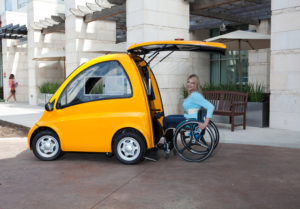Why I Won’t Phrase a Liberation as a Limitation
Let’s finally bury the terms “wheelchair-bound” and “confined to a wheelchair”!
For someone whose legs don’t work or don’t work well, a wheelchair is a device of liberation, opening up many places s/he couldn’t reach otherwise. With the aid of a wheelchair, a person with walking disabilities can run errands, walk in the park, hold a job that might be otherwise unavailable…
Language, too, can be liberating, instead of restricting. How about “uses a wheelchair” or “is in a wheelchair”? The way we frame things influences how we and others perceive them—that’s the secret of marketing, of politics, of education, and of changing the world. Let’s market the idea that people with disabilities can be strong, healthy, active participants in society, not bound to the furniture.
And while we’re at it, let’s do a better job of making more things accessible to people who use wheelchairs. That means more curb cuts, wider doorways, and wider bathrooms. It means rethinking transportation of people with disabilities,

changing the ways we wait in lines, and of course, how we design wheelchairs. It means thinking about the field of vision of someone whose head is several feet lower than a standing male adult.
And also it means being much more accurate in our descriptions of just about everything. Example: If you run a restaurant and the bathroom is a 24-inch-wide sliver of space on the main floor with barely enough room for a standing human to turn around—or worse, down a steep flight of steps and a narrow hallway in the basement—don’t describe your restaurant as wheelchair-accessible, even if the front door is barrier-free.
Fix things so your place of business really IS accessible. As Boomers age and our bodies get less reliable, this makes good business sense, because more of your customers will continue to be able to visit your business.
Note: I am able-bodied. I wrote this in response to seeing a “wheelchair-bound” comment from a marketing friend in his late 50s. My views on this have been shaped by:
- My experience in my early 20s as a paid organizer for an elder’s rights organization
- Seeing the incredible things that people with disabilities have been able to accomplish when society accepts them as people who can contribute and doesn’t treat them as a burden—and noticing how much more that was in evidence after physical barriers began, slowly, to be eliminated once the Americans with Disabilities Act of 1990 took effect.
- Hosting a meeting and discovering that someone who wanted to attend couldn’t come because I lived at the time in a second-floor walk-up
- 6 years in my 30s and 40s as an official city-appointed member of the Northampton, Massachusetts Commission on Disability, dealing with such issues as how local theaters could provide access to people with mobility impairments

